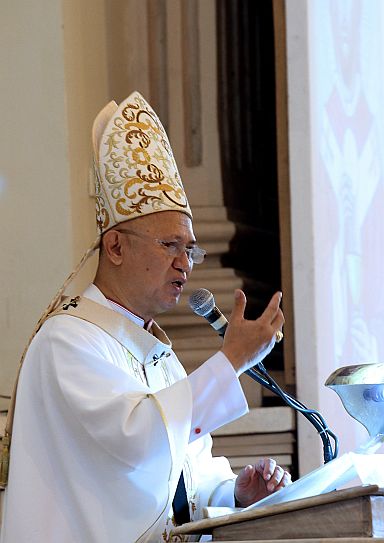
CEBU Archbishop Jose Palma delivers his homily during the Ordination Mass of the 12 new priests at the Cebu Metropolitan Cathedral on Tuesday. (CDN PHOTO/JUNJIE MENDOZA)
Ill-advised and half-baked.
This was how Cebu Archbishop Jose Palma described the decision of President Rodrigo Duterte to publicly identify the local officials allegedly involved in the illegal drugs trade.
While he supports the President’s campaign to curb illegal drugs, the 66-year-old prelate said the fundamental requirements of due process and the rule of law have not been observed when he announced the names of so-called “narco-politicians,” judges and policemen involved in the illicit trade.
He likewise called the drug list “not realistic,” while at the same time expressing doubt over the inclusion of former Cebu City mayor Michael Rama in the list.
“There are people who welcomed the President’s move to name names, but there are also those who were anxious about what he did,” Palma told reporters after he ordained 12 new priests at the Cebu Metropolitan Cathedral in downtown Cebu City Tuesday morning.
The prelate stressed he acknowledged improvements with regard to the peace and order situation in Cebu since Duterte assumed the presidency. But he also emphasized that dignity of the human person and human life are equally important.
“There are definitely positive changes that the Church felt. This is a signal of hope,” Palma said. “We’re just wary about the unverified listing and extrajudicial killings.”
Like some people, Palma said he too has questions on the veracity of drugs list given to Duterte.
He added: “The President said it (contents of drug list) may be true or may not be true. The question is what if it’s not true? Names were already revealed in public. How could those who may have been wrongly accused redeem their dignity and the good name they built all these years?”
“While we appreciate the efforts against illegal drugs, we also question the process things are done,” Palma said.
Not reliable
He said he was surprised when Duterte identified the name of one person he knew, Judge Roberto Natividad of the Regional Trial Court Branch 32 in Calbayog City, who is already dead.
Natividad was gunned down by a still unidentified assailant in January 2008.
“Paggawas sa name sa judge, nakasulti ko nga kilala man ko kini nga judge. Namatay na man kini (When the judge’s name was mentioned, I said I know this person. He is already dead),” said Palma who used to serve in the Diocese of Calbayog in Samar from 1999 to 2006.
That alone, he said, means that the list given to Duterte was not reliable.
“The list is either not updated or not an assurance that it’s really realistic,” he said.
Palma, however, said that except for the fact that he knew that Natividad was an RTC judge in Calbayog City, he did not know him personally to make a judgment on his character.
Palma also expressed doubts that Rama was a drug protector, saying the latter might have been included in the list after he admitted to have dealt with the late drug lord Cresistomo “Tata Negro” Llaguno whom the former played basketball with.
Rama said he wanted to help Llaguno surrender to authorities but the latter was gunned down in Barangay Lorega-San Miguel, Cebu City in 2010.
“He (Rama) wanted to help one drug (lord) who was trying to change his life, was ready to reveal certain things but got killed. The former mayor’s move may have been misinterpreted,” Palma said.
Although contents in Duterte’s drug list were reportedly “validated and revalidated” by different law enforcement units, Palma said accusations should go with sufficient evidence and proof.
Wounded
Rama, in a press conference yesterday, revealed he visited the Philippine Drug Enforcement Agency (PDEA) head office in Manila on Monday and the agency has no document to link him to illegal drugs.
Rama said he went to see PDEA Director General Isidro Lapeña and asked the latter who was the drug lord he was supposedly protecting, but Lapeña could not give an answer.
According to Rama, he decided to go to PDEA instead of meeting with Philippine National Police Director General Ronald “Bato” dela Rosa on the advise of a person he declined to name.
Rama said that while he was focused on clearing his name, he also believed it would only be right for President Duterte to clear the names of those on his drug list if they are found innocent of the accusation.
When asked by reporters how he was, Rama said: “I’m wounded of course. But I have to keep (my) cool.”
Cryptic reply
PDEA Central Visayas Director Yogi Felimon Ruiz, on the other hand, gave a cryptic answer when asked if his office has any record linking Rama to illegal drugs.
He said he could not say anything on the matter because if he did, he would just was be “cooking” himself. He did not elaborate except to point out that he would not know much since it’s just been a week since he assumed his post in the region.
Ruiz instead opined that the list released by the President did not just include those protecting or selling drugs but also officials who failed address the drug problem under their watch.
“If (the) President (saw that) based on their data gathered, you did not do your part, then (he would think) you are part of the problem,” Ruiz added.
Palma, meanwhile, said that to assist the government in its drive against illegal drugs, the Archdiocese of Cebu intends to come up with parish-based programs that will help drug users get rid of their old habit.
He encouraged priests to open parishes and chapels to drug users who seek their help for rehabilitation.